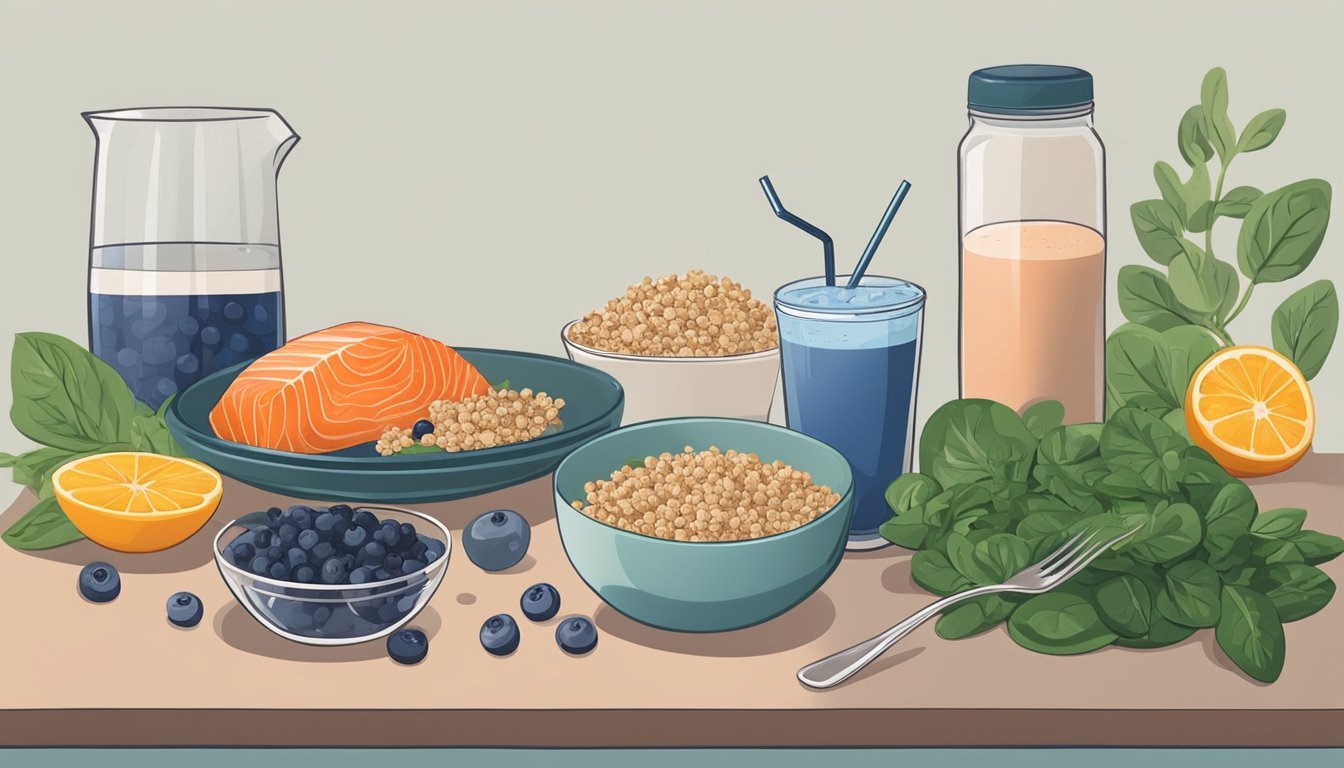Best Foods for Muscle Recovery Post-Workout
Optimizing Nutrition for Strength and Healing
After engaging in physical activity, the body enters a recovery phase where it repairs and strengthens muscles, making what one consumes post-workout pivotal for muscle recovery. The right foods can mitigate muscle soreness, replenish energy stores, and facilitate the repair of muscle fibers. Consuming a balanced mix of proteins, carbohydrates, and fats is essential for initiating the muscle repair process and preparing the body for its next exercise session.
Proteins are the building blocks of muscle repair, and post-workout, they aid in healing the micro-tears in muscle fibers caused by intense exercise. Carbohydrates, on the other hand, are key to replenishing muscle glycogen that has been depleted during a workout. Additionally, certain foods have properties such as anti-inflammatory effects or specific amino acids that can further enhance muscle recovery time.
Hydration also plays a critical role in the recovery process. Fluid intake post-exercise helps to restore hydration status, which is often compromised through sweating, and aids in nutrient transport to the muscles. It is important that individuals pay attention to their post-workout nutrition to maximize their recovery and the effectiveness of their physical training.
Understanding Muscle Recovery
Muscle recovery is a critical element of every fitness regimen, as it allows the body to heal and strengthen after intense physical activity. When individuals engage in workouts, especially those that are high-intensity or involve resistance training, the muscle tissue experiences microscopic damage. This is a normal process where fibers within the muscles are subject to stress and small tears.
Immediately after muscle damage occurs, the body initiates a repair process. Muscle repair involves the removal of damaged proteins and the synthesis of new ones. It's during this time that muscles may become stronger and more resilient, adapting to the stress that caused the initial damage.
Additionally, muscle soreness, often referred to as delayed onset muscle soreness (DOMS), can occur. It typically arises within a day or two after the exercise session. Soreness is a temporary condition, although it can temporarily affect future performance levels.
Inflammation is also a natural response following muscle damage, playing a key role in the recovery process. During this phase, increased blood flow and nutrients to the affected area support healing. Managing this inflammation properly is essential since excessive inflammation can hinder muscle recovery and growth.
Understanding the phases and significance of muscle recovery can assist in designing workout routines that include appropriate rest periods. Permitting muscle recovery is essential to avoiding overtraining and improving overall performance.
Importance of Hydration
Maintaining hydration is crucial for muscle recovery and overall performance during workouts. Proper fluid intake helps facilitate various physiological functions that directly impact muscle repair and athletic endurance.
Water and Muscle Recovery
Water is fundamental to muscle recovery post-workout because it transports nutrients to the muscles and helps remove waste products. When an individual exercises, their muscles produce waste, such as lactic acid, which can contribute to soreness and fatigue. Adequate water consumption aids in flushing out these byproducts, thus promoting quicker muscle repair. Additionally, water is essential to maintain the volume of blood, which ensures that oxygen and nutrients are efficiently delivered to the muscles in need of repair.
Electrolytes and Performance
Electrolytes, including sodium, potassium, calcium, and magnesium, play a significant role in post-workout recovery. These charged particles help regulate fluid balance within the body, support nerve function, and muscle contraction. Here's how electrolytes support performance and hydration:
Sodium and Chloride: Vital for fluid balance and nerve signal transmission.
Potassium: Helps with muscle contractions and offsets the effects of sodium, aiding in proper fluid balance.
Calcium: Integral for muscle contractions and neurotransmitter release.
Magnesium: Supports energy metabolism and muscle relaxation, aiding in the reduction of cramps.
It's imperative for athletes to rehydrate after exercising, not only with water but also by replenishing electrolytes, especially if the workout session was intense or occurred in high-temperature environments. This can be achieved through electrolyte-enriched beverages or foods that naturally contain these minerals. Proper rehydration with electrolytes can prevent muscle cramps, maintain muscle function, and enhance recovery clarity.
Macronutrients for Recovery
The repair and rebuilding of muscle tissues after strenuous activity hinges on the adequate intake of key macronutrients. These nutrients play distinct roles in reducing fatigue and promoting recovery.
Proteins and Amino Acids
Proteins are crucial for muscle repair and growth. They break down into amino acids, which are the building blocks for new proteins and muscle tissue. For optimal muscle protein synthesis, a source of high-quality protein containing all essential amino acids is beneficial after a workout.
Examples:
Chicken
Fish, with a focus on salmon for its omega-3 fatty acids
Eggs
Dairy products, like Greek yogurt or milk
Carbohydrates and Glycogen
Carbohydrates are essential for replenishing the muscle's glycogen stores that are depleted during exercise. Glycogen restoration is key to preventing fatigue and preparing the muscles for the next workout session.
Simple carbs for immediate energy replenishment
Complex carbs for sustained energy release
Sources:
Whole grains like brown rice and oats
Starchy vegetables such as sweet potatoes and taro root
Fats and Recovery
Fats play a subtler, yet important role in muscle recovery. While they are not the primary source of fuel for workouts, fatty acids can help reduce inflammation and are integral to overall health.
Monounsaturated fats, such as those found in avocado and nuts
Polyunsaturated fats, including omega-3 fatty acids from fish oil and flaxseeds
Post-Workout Nutrition
After a workout, the body needs specific nutrients to repair muscles and replenish energy stores. Choosing the right foods and timing their intake correctly optimizes the recovery process.
Timing and Nutrient Delivery
Nutrient timing is crucial for muscle recovery. Dietitians recommend consuming a meal or snack within 45 minutes to an hour after exercising. This window allows the body to utilize nutrients efficiently for repair and recovery. Key nutrients include:
Protein: Essential for muscle repair.
Carbohydrates: Replenish energy stores.
Fluids: Hydrate the body post-exercise.
Nutrient Function Ideal Timing Protein Muscle repair and synthesis Within 30-45 minutes Carbohydrates Energy replenishment Within 30-45 minutes Fluids Rehydration Immediately
Balanced Meals and Snacks
For post-workout nutrition, a combination of proteins and carbohydrates is ideal. Registered dietitians suggest including the following for a balanced post-workout meal:
Lean Proteins: Such as chicken, turkey, eggs, or plant-based sources like tofu.
Complex Carbohydrates: Like sweet potatoes, rice, oats, or whole-grain bread.
Healthy Fats: Avocado or nuts can be added in moderation for additional benefits.
Snacks should also contain a mix of protein and carbohydrates. Examples include:
Greek Yogurt with Fruit: Provides protein and quick-digesting carbs.
Protein Shakes: Convenient for those on-the-go, offering a fast-acting protein source.
Turkey Jerky: A portable protein without added sugars.
Balanced meals and snacks support recovery by providing the body with the necessary nutrients it needs post-workout.
Specific Recovery Foods
After an intense workout, it's important to refuel the body with the right nutrients to aid muscle recovery. Specific foods can help replenish energy stores, repair and build new muscle tissue, and reduce inflammation.
Protein-Rich Foods
Protein is crucial for muscle repair and growth. Chicken is a lean source of high-quality protein which also contains essential amino acids necessary for muscle recovery. Eggs are another excellent protein source, providing all nine essential amino acids. For vegetarians or those looking for a dairy option, Greek yogurt and regular yogurt pack a significant protein punch. Additionally, protein shakes with whey protein offer a quick and convenient way to consume high protein immediately after a workout.
Chicken: Lean, high in protein
Eggs: Contain all essential amino acids
Greek Yogurt: High in protein, contains probiotics
Whey Protein: Easily digestible, supports muscle repair
Carbohydrate-Rich Foods
Carbohydrates are the body's primary energy source and are vital for replenishing glycogen stores post-exercise. Quinoa is not only rich in carbohydrates but also a complete protein. Sweet potatoes and potatoes are other excellent sources of complex carbohydrates which provide sustained energy release. These carbs are also packed with other helpful nutrients like fiber and potassium.
Quinoa: A complete protein, rich in carbs
Sweet Potatoes: High in complex carbohydrates, vitamin A
Potatoes: Source of potassium, fiber
Fruits and Vegetables
Fruits such as bananas, berries, watermelon, and blueberries are rich in carbohydrates and contain essential vitamins, fibers, and antioxidants which aid in the reduction of muscle soreness and inflammation. Tart cherry juice is known for its anti-inflammatory properties and can help reduce muscle damage. For vegetables, the darker and leafier, the better—they're often high in nutrients beneficial for recovery.
Banana: Rich in potassium, helps prevent cramps
Berries & Blueberries: Antioxidants help with inflammation
Watermelon: Hydrates and provides essential nutrients
Tart Cherry Juice: Reduces muscle damage and inflammation
Healthy Fats and Fiber
Avocado delivers healthy monounsaturated fats and fiber, essential for overall health and aiding in nutrient absorption. Nuts and seeds, including chia seeds, are dense in nutrients, providing omega-3 fatty acids, protein, and fiber. These fats are important for reducing inflammation and promoting muscle recovery.
Avocado: Healthy fats and fiber for nutrient absorption
Nuts & Seeds: Contain omega-3 fatty acids and protein
Chia Seeds: High in fiber and antioxidants
By incorporating these specific foods into their post-workout routine, individuals can support their body's recovery process efficiently and effectively.
Supplementing Recovery
To optimize muscle recovery post-workout, one can incorporate specific supplements into their nutrition plan. These supplements can range from protein powders and bars for muscle repair to vitamins and minerals for overall health, and specialty items like amino acids for enhanced recovery.
Protein Powders and Bars
Protein is crucial for muscle repair after exercise. Protein powders and bars provide a convenient way to ensure adequate protein intake, especially when whole food sources are not available. For example, whey protein is a popular choice due to its high biological value and rapid absorption, making it ideal for post-workout consumption.
Types of Protein Powders: Whey, Casein, Soy, Pea
Popular Bars: Contain a blend of proteins and often include added nutrients
Vitamins and Minerals
Post-exercise, it's important to replenish vitamins and minerals that are vital for the body's recovery processes. Vitamins like vitamin C and E act as antioxidants to help with tissue repair, while minerals such as zinc and magnesium support muscle function and protein synthesis.
Key Vitamins: C, E, B-Complex
Essential Minerals: Zinc, Magnesium, Iron, Potassium
Specialty Supplements
Specialty supplements, including sports drinks, fish oil, and L-citrulline, can further aid muscle recovery.
Sports Drinks: Provide electrolytes and carbohydrates for hydration and energy replenishment
Fish Oil: Contains omega-3 fatty acids, known for their anti-inflammatory properties
L-citrulline: an amino acid that may help reduce muscle soreness
Specialty Supplement Benefit Sports Drinks Hydration, Electrolytes Fish Oil Reduce Inflammation L-citrulline Decrease Soreness
Incorporating these supplements as part of a recovery regimen can be done alongside a balanced diet to support the body's natural repair processes.
Rehydration Solutions
Rehydration is crucial for muscle recovery, with options ranging from sports drinks to natural juices and foods. These solutions not only replenish fluids but also restore electrolyte balance, which is vital for physiological function after exercise.
Sports Drinks and Watermelon Juice
Sports drinks provide a convenient way for athletes to rehydrate. These beverages typically contain a balance of electrolytes and carbohydrates to help recover the body's fluid levels and provide energy post-workout. One popular choice is watermelon juice, as it naturally includes a rich mix of water, essential vitamins, and amino acids. Watermelon juice assists in rehydration and also provides citrulline, which can help reduce muscle soreness.
Electrolytes in sports drinks:
Sodium
Potassium
Calcium
Magnesium
Components in watermelon juice aiding recovery:
Water content
Vitamin C
Potassium
Citrulline
Natural Hydrating Foods
Cucumbers and milk stand out as natural hydrating foods post-exercise. Cucumbers are composed of 95% water, which makes them an excellent choice for restoring hydration levels in the body. They can be easily incorporated into post-workout snacks or meals.
On the other hand, milk and in particular, chocolate milk, have been recognized for their rehydration capability due to their optimal balance of carbohydrates and protein. This combination helps to not only rehydrate but also to facilitate muscle repair and growth. The proteins, carbohydrates, and fats in milk provide a sustained energy source while the fluid content effectively helps replace lost bodily fluids.
Hydration benefits of cucumbers:
High water content
Provides vitamins and minerals
Recovery aspects of milk and chocolate milk:
Carbohydrates
Protein
Fluids
Electrolytes (in milk)
Alternative Recovery Methods
While nutrition plays a crucial role in muscle recovery, other methods can significantly enhance the process post-exercise. These include adequate rest, employing massage or foam rolling techniques, and engaging in active recovery. Each method targets muscle soreness and aids in recovery from resistance training in specific ways.
Rest and Sleep
Rest is the cornerstone of muscle recovery. During sleep, the body undergoes repair and recovery processes. It is recommended that adults aim for 7-9 hours of quality sleep per night to facilitate optimal muscle recovery.
Massage and Foam Rolling
Massage can help to alleviate muscle soreness by increasing blood flow and reducing muscle tightness. Foam rolling serves as a self-myofascial release technique, which can help muscles return to normal function. Regular use after workouts can aid in reducing delayed onset muscle soreness (DOMS).
Active Recovery
Active recovery involves low-intensity exercise following more intense workout days. It assists in reducing lactic acid buildup and promotes circulation, which is beneficial for muscle repair and alleviating soreness. Examples of active recovery include walking, yoga, or light cycling.
Dietary Considerations and Allergies
When tailoring a post-workout diet, individuals must account for personal dietary restrictions and potential allergies to ensure optimal recovery while maintaining overall health.
Customizing Your Post-Workout Diet
For those with food sensitivities or allergies, working with a registered dietitian can provide a personalized eating plan that accommodates these needs. Plant-based proteins such as tofu, quinoa, and legumes offer alternatives for individuals seeking non-animal protein sources that are generally easily digestible and free from common allergens like dairy or eggs.
A variety of gluten-free options are available for those with gluten intolerance or celiac disease, ensuring that they can also benefit from nutrient-rich recovery foods. Whole foods such as sweet potatoes, rice, or gluten-free oats are excellent carbohydrate sources that help replenish glycogen stores without gluten exposure.
It's crucial to read food labels and be aware of food preparation methods to avoid cross-contamination with allergens. Knowledgeable choices in food selection and preparation can significantly impact an individual's recovery and performance while adhering to their dietary needs.
Consulting Healthcare Professionals
When considering nutrition for muscle recovery post-workout, healthcare professionals offer tailored guidance. Their expertise supports optimal performance and recovery.
The Role of a Dietitian
A registered dietitian (RD) specializes in creating personalized nutrition strategies to enhance an individual's performance and recovery. They assess dietary needs based on activity level, medical history, and personal goals. With their in-depth knowledge of food functions and metabolic processes, dietitians can recommend specific foods that aid muscle recovery post-workout, ensuring the individual receives a balance of macro and micronutrients essential for repair and growth.
Macronutrients: They may suggest a ratio of carbohydrates, proteins, and fats tailored to the individual's workout intensity and duration.
Micronutrients: They identify micronutrients—a list that may include vitamins such as C and D, and minerals like magnesium and calcium—critical for muscle function and recovery.
A dietitian can provide evidence-based advice on supplementation, navigating commercial claims with scientific scrutiny. They also support the development of meal plans and timing to align with training schedules.
By working with a registered dietitian, athletes and fitness enthusiasts can receive customized nutritional advice that directly contributes to their muscle recovery and overarching performance goals.
Conclusion
Post-workout nutrition is vital for muscle recovery and growth. It provides the necessary nutrients to repair muscle tissues and refuel the body’s energy stores. Optimal replenishment involves consuming a mix of protein, carbohydrates, and fats.
They should consider including foods rich in quality protein to aid in repair and to promote muscle protein synthesis. Carbohydrates are crucial as well; they help to restore glycogen levels, supporting overall recovery and performance. Incorporating healthy fats can also be beneficial for inflammation reduction.
Hydration is another key component of recovery. Adequate fluid intake is essential to replace fluids lost during exercise and to support metabolic functions. They should also ensure to stay hydrated throughout the day, not just post-workout.
Consider these points for effective recovery:
Aim to eat a balanced meal within an hour after exercising.
Consume a variety of fruits and vegetables for their micronutrients and antioxidants, which can further support the recovery process.
For individuals in a rush, ready-to-consume options like tart cherry juice can be convenient and effective. Such alternatives can still provide essential nutrients to assist in the recovery phase.
Carefully selecting post-workout nutrition can make a significant difference in how quickly and effectively one recovers, setting the stage for consistent performance and muscle growth over time.







